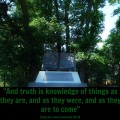 Today, the definition of truth seems to be under attack. Many have rejected the idea that there are any absolute truths and that truth is either entirely individual or put to a popularity vote. This ignores, of course, the fact that there have always been absolute truths and that popularity or wishful thinking can’t make them disappear. We cannot make the law of gravity disappear by deciding not to believe in it and we can’t change God’s laws by choosing not to accept them either. “The thing about truth is that it exists beyond belief. It is true even if nobody believes it. … There is indeed such a thing as absolute truth—unassailable, unchangeable truth.” President Dieter F. Uchtdorf told an audience of young adults in January 2013. He is the Second Counselor in the First Presidency of the Church.
Today, the definition of truth seems to be under attack. Many have rejected the idea that there are any absolute truths and that truth is either entirely individual or put to a popularity vote. This ignores, of course, the fact that there have always been absolute truths and that popularity or wishful thinking can’t make them disappear. We cannot make the law of gravity disappear by deciding not to believe in it and we can’t change God’s laws by choosing not to accept them either. “The thing about truth is that it exists beyond belief. It is true even if nobody believes it. … There is indeed such a thing as absolute truth—unassailable, unchangeable truth.” President Dieter F. Uchtdorf told an audience of young adults in January 2013. He is the Second Counselor in the First Presidency of the Church.
Absolute truths have long helped to hold the universe together. They prevent people from murdering others, they remind us to be kind, and they direct our attitudes towards those we love. The Bible outlines basic absolute truths—truths that impact our eternal well-being and do not change—no matter how our attitude towards those things change.
For Mormons (a nickname for members of The Church of Jesus Christ of Latter-day Saints), eternal truths are those taught by Jesus Christ. Mormons are taught to seek out, learn, and support those eternal truths. How do they know what they are?
Spiritual education is, of course, part of the process. Mormons are given many opportunities to study the scriptures and the teachings of the prophets both at home and at church. However, they are also taught they must never take the word of their teachers and leaders as to what constitutes truth. They are to trust God, but that comes with a right and even a responsibility to gain a personal testimony. That testimony comes as the result of prayer after a time of study and reflection. We must approach prayer with faith that God will answer us and with a willingness to accept whatever answer we are given, even if it contradicts what we believed in the past or what we want to be true.
“As you accept the responsibility to seek after truth with an open mind and a humble heart, you will become more tolerant of others, more open to listen, more prepared to understand, more inclined to build up instead of tearing down and you will be more willing to go where God wants you to go,” he said.
Read more about President Uchtdorf’s thoughts on truth.
Joseph F. Smith, a former Mormon prophet, said:
“We believe in all truth, no matter to what subject it may refer. No sect or religious denomination in the world possesses a single principle of truth that we do not accept or that we will reject. We are willing to receive all truth, from whatever source it may come; for truth will stand, truth will endure.”
Mormons don’t believe they possess all the truth while other church possess none at all. Church leaders often quote people of other faiths when they express a great truth in the most powerful way.
Dallin H. Oaks, a Mormon apostle addressed the issue of tolerance in relationship to absolute truth. He noted that people with values struggle more with tolerance than do people with no values or with fluctuating values. However, he offered three guidelines to help people who accept the existence of absolute truth to also know the limits and requirements of tolerance.
First, we must live with respect for the differing opinions of others, recognizing that each person is a beloved child of God—even those people we disagree with.
Second, we are commanded to live in the world with people who see the world differently than we do. We must protect our right to live our faith while living in this world—even legally when necessary. At the same time, we have to respect the same rights of other faiths.
Third, we are commanded to show respect for others and their beliefs, but we are commanded not to tolerate wrong behavior. Many people agree with this when it is something obvious, such as murder. They are less accepting of this idea when it is their wrong behavior that is being challenged. He suggests that tolerance is just one side of a coin labeled tolerance and respect. The other side is labeled truth. Both sides must exist in order to have a coin at all. We need not speak out when a sin is committed privately, but we must when it impacts us, such as when people swear around us or want to commit a sin in our own homes.
Elder Oaks also addressed, briefly, how we decide which principles to take to the public square and legislate. He suggested we must be selective in choosing issues and those issues must not relate directly to worship or religious practice, such as requiring specific worship actions. However, they can relate to public morality, health, safety, and religious freedom.
Elder Oaks said debates must avoid extremism and be centered on respect and civility. We must show respect for others and teach by example. When people see something that works, they are more inclined to accept it.
Elder Oaks on truth and tolerance.
The late Terrie Lynn Bittner—beloved wife, mother, grandmother, and friend—was the author of two homeschooling books and numerous articles, including several that appeared in Latter-day Saint magazines. She became a member of the Church at the age of 17 and began sharing her faith online in 1992.





